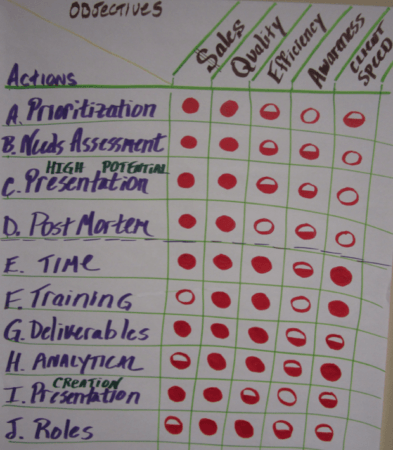When you facilitate alignment, you help groups identify gaps, omissions, and overkill, and confirm the appropriateness and balance of their action plan.
Rationale to Facilitate Alignment
Method to Facilitate Alignment
First of all, create a matrix with your options (e.g., actions) and the targets (e.g., goals). Common items that may be aligned include the comparison of strategies to objectives. To facilitate alignment, consider these three steps:
- First, complete the matrix with a linear approach, but be careful to always ask the open-ended question, “To what extent does ‘x’ (i.e., option, action, or strategy) support ‘y’ (i.e., target, goal, or objective) ?”
- Having defined the PowerBalls (preferably with a legend that is visible throughout the activity for your participants to reference), label each cell with either a high, low, or moderate PowerBall symbol, indicating the extent to which the option supports the target.
- While completing the matrix, ask the group to confirm completeness. Add anything missing or modify as required (i.e., Create a new option or calibrate an existing option).
Note: Since the solid balls indicate high and the empty circles indicate low, the half-filled balls indicate moderate. We like to define High as mandatory, “must have at any price.” We define Low as “would like to have but not willing to pay extra.” The stuff in between is Moderate, the stuff for which we would be willing to “pay a reasonable amount.” The equivalent to the MoSCoW tool would be: Must have, Should have, Could have, and Won’t have (null).
For seasoned professionals and alumni, consider using the Book-end method to equal dispersion after you complete your initial baseline analysis.
______
Don’t ruin your career by hosting bad meetings. Sign up for a workshop or send this to someone who should. MGRUSH workshops focus on meeting design and practice. Each person practices tools, methods, and activities every day during the week. Therefore, while some call this immersion, we call it the road to building high-value facilitation skills.
Our workshops also provide a superb way to earn up to 40 SEUs from the Scrum Alliance, 40 CDUs from IIBA, 40 Continuous Learning Points (CLPs) based on Federal Acquisition Certification Continuous Professional Learning Requirements using Training and Education activities, 40 Professional Development Units (PDUs) from SAVE International, as well as 4.0 CEUs for other professions. (See workshop and Reference Manual descriptions for details.)
Want a free 10-minute break timer? Sign up for our once-monthly newsletter HERE and receive a timer along with four other of our favorite facilitation tools, free.
Related videos
-
Basic Facilitation Skills: #1 How to Facilitate Alignment using Power Balls and a Decision Matrix
-
Basic Facilitation Skills: #2 How To Facilitate Consensual Prioritization with a Decision Matrix

Terrence Metz, MBA, CSM, CSPF, PSP01, HTTO1, is the Managing Director of MG RUSH Facilitation Leadership, Training, and Meeting Design, an acknowledged leader in structured facilitation training, and author of “Meetings That Get Results – A Facilitator’s Guide to Building Better Meetings.” His FAST Facilitation Best Practices blog features nearly 300 articles on facilitation skills and tools aimed at helping others lead meetings that produce clear and actionable results. His clients include Agilists, Scrum teams, program and project managers, senior officers, and the business analyst community among numerous private and public companies and global corporations. As an undergraduate of Northwestern University (Evanston, IL) and an MBA graduate from NWU’s Kellogg School of Management, his professional experience has focused on process improvement and product development. He continually aspires to make it easier for others to succeed.


